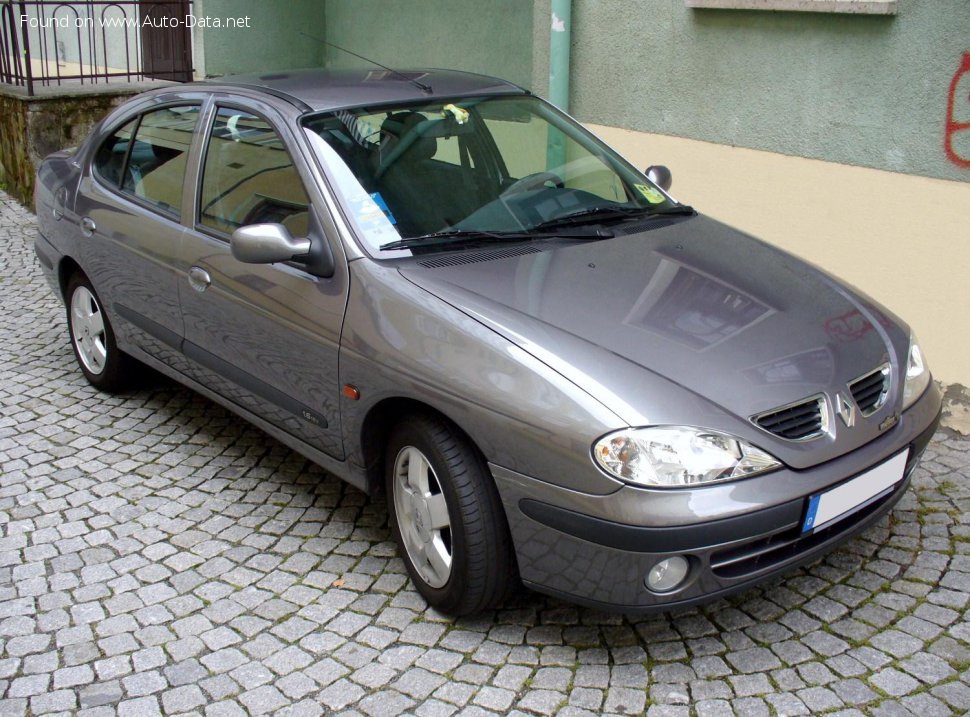2001 Renault Megane I Classic (Phase II, 1999) 1.8 16V (116 Hp) | Specifications




| Acceleration 0 - 100 km/h | 9.5 sec |
| Acceleration 0 - 60 mph | 9 sec |
| Acceleration 0 - 62 mph | 9.5 sec |
| Fuel Type | Petrol (Gasoline) |
| Fuel consumption (economy) - combined | 7.7 l/100 km |
| Fuel consumption (economy) - extra urban | 6.2 l/100 km |
| Fuel consumption (economy) - urban | 10.2 l/100 km |
| Maximum speed | 197 km/h |
| Weight-to-power ratio | 9.9 kg/Hp, 100.9 Hp/tonne |
| Weight-to-torque ratio | 7.3 kg/Nm, 137.4 Nm/tonne |
Drivetrain, brakes and suspension specs
| Assisting systems | ABS (Anti-lock braking system) |
| Drive wheel | Front wheel drive |
| Drivetrain Architecture | The Internal combustion engine (ICE) drives the front wheels of the vehicle. |
| Front brakes | Ventilated discs |
| Front suspension | Independent coil spring |
| Number of gears and type of gearbox | 5 gears, manual transmission |
| Power steering | Hydraulic Steering |
| Rear brakes | Disc |
| Rear suspension | Torsion |
| Steering type | Steering rack and pinion |
| Tires size | 185/60 R15 |
| Wheel rims size | 6.5J x 15 |
Engine specs
| Compression ratio | 9.8:1 |
| Coolant | 7.9 l |
| Cylinder Bore | 82.7 mm |
| Engine Model/Code | F4P |
| Engine aspiration | Naturally aspirated engine |
| Engine configuration | Inline |
| Engine displacement | 1783 cm3 |
| Engine layout | Front, Transverse |
| Engine oil capacity | 5 l |
| Fuel injection system | Multi-port manifold injection |
| Number of cylinders | 4 |
| Number of valves per cylinder | 4 |
| Piston Stroke | 83 mm |
| Power | 116 Hp @ 5750 rpm. |
| Power per litre | 65.1 Hp/l |
| Torque | 158 Nm @ 3750 rpm. |
| Valvetrain | DOHC |
Dimensions
| Front track | 1450 mm |
| Height | 1420 mm |
| Length | 4436 mm |
| Minimum turning circle (turning diameter) | 11.30 m |
| Rear (Back) track | 1432 mm |
| Wheelbase | 2580 mm |
| Width | 1698 mm |
General information
| Body type | Sedan |
| Brand | Renault |
| Doors | 4 |
| End of production | 2003 year |
| Generation | Megane I Classic (Phase II, 1999) |
| Model | Megane |
| Modification (Engine) | 1.8 16V (116 Hp) |
| Powertrain Architecture | Internal Combustion engine |
| Seats | 5 |
| Start of production | 2001 year |
Space, Volume and weights
| Fuel tank capacity | 60 l |
| Kerb Weight | 1150 kg |
| Max. roof load | 80 kg |
| Permitted towbar download | 55 kg |
| Trunk (boot) space - maximum | 1310 l |
| Trunk (boot) space - minimum | 510 l |
Frequently Asked Questions
Here are answers to some common questions
The VIN number, also known as the VIN code, is the vehicle identification number. VIN is an abbreviation of the English term Vehicle Identification Number. The VIN number is a unique set of 17 characters that car manufacturers assign to all vehicles they produce. The VIN code can be found on various parts of the car body or in the registration documents.
In the CarVertical vehicle report, you will find the most important information about the vehicle that will allow you to assess the condition of the vehicle. In the report, you will find information such as vehicle mileage, accident data, countries of previous registrations, records from searched car databases, and much more useful information.
CarVertical reports are available immediately or can take up to a few minutes. The service is provided 24 hours a day, 7 days a week, reports are generated automatically. It basically takes as long as it takes to process your payment - the sooner the money reaches your CarVertical account, the sooner you will receive a report.
First of all, CarVertical is generally the world's first provider of VIN history reports by car code, receiving some of the data in real-time directly from the car. The information obtained in this way is the most up-to-date, which is why it is so operative. In addition, CarVertical uses BlockChain technology, so the data available to CarVertical is genuine and real.
Information about cars is obtained from many sources, including car services, national registers of various countries, insurance companies, "connected" car parks, and so on.
